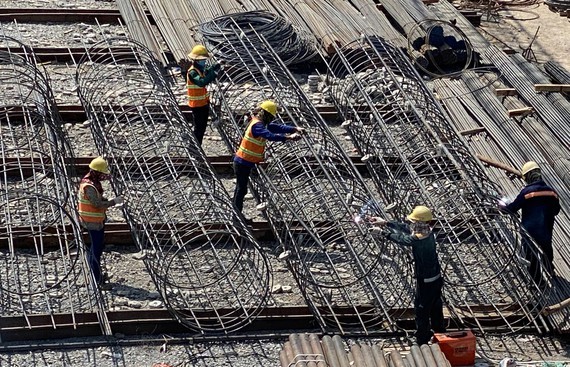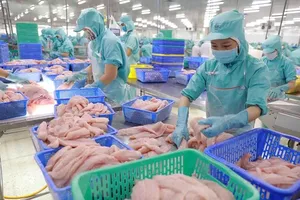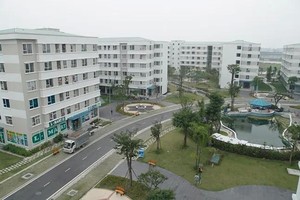 Steel costs account for 20 percent of the total construction costs. (Photo: SGGP)
Steel costs account for 20 percent of the total construction costs. (Photo: SGGP)
Supply remains plentiful
It is recorded in Ho Chi Minh City that steel prices increase continuously, so construction material stores must quote prices to customers every two days, while previously, prices were always stable during the week and month, or quarter. For instance, the price of steel coil was around VND12,000 per kilogram before July last year, but by the end of April this year, the price has risen to around VND17,000 per kilogram, an increase of about VND5,000 per kilogram. In April, steel prices had changed at least four times, with an upward trend.
From the beginning of May to now, steel prices have temporarily not increased as drastically as in April. Previously, the Vietnam Steel Association (VSA) forecasted that steel prices will only increase until the end of the second quarter of this year. However, with what is happening in the global steel markets, such as China, the US, India, and the EU, VSA has revised its forecast that steel prices will possibly increase until the end of the third quarter of this year.
“The increasing prices of steel and some construction materials, such as cement, have made our contractors unable to handle and face many difficulties. As for signed projects, we must try to negotiate with investors to adjust prices. If we fail to negotiate, we must also carry out the project to keep the company's reputation. Only with new contracts, the company will adjust the price following the increase in construction material prices”, said Mr. Mai Dai Khoat, Director of Tan Dat Thanh Construction-Trading Co., Ltd in District 12.
According to the Chairman of the Vietnam Association of Construction Contractors (VACC) Nguyen Quoc Hiep, normally, steel costs account for 20 percent of the total construction costs, so when steel prices increase by 40-45 percent, the construction costs will be raised extremely high. Moreover, not only steel, but the prices of other materials, such as cement, bricks, and tiles, also climb, making the construction industry miserable. The construction contractors have been pushed into a very difficult situation when the steel prices increased like that, Mr. Hiep shared.
From the investor's perspective, some investors said that they were considering adjusting the prices of construction works. Depending on each building structure, the construction price may rise by around 20 percent.
Although the steel prices increased, it is recorded that in the market, there is no shortage of steel, and steel supply is still plentiful. Some experts said that steel prices went up possibly because the prices of imported raw materials, such as billet, surged. To find out the reason, VACC has now proposed to the Government to check and clarify the reason why the prices of steel escalate heavily as currently while the electricity prices and input production costs have not increased.
Manufacturers earn high profits
According to the analysis of many steel manufacturers, the rising momentum in steel prices not only comes from the increasing prices of raw materials, such as billet but also due to the lack of supply, especially in the US and European markets. For the past 10 years, developed countries no longer operated blast furnaces for steel production, leaving only China. However, China is also cutting steel production for environmental protection. This has caused the supply to be no longer as redundant as in the previous period. Meanwhile, the global demand is high for economic recovery after the Covid-19 pandemic.
Currently, to catch the opportunity, many steel enterprises are planning to invest in expanding and improving production capacity. For example, Nam Kim Steel plans to invest in a warehouse for the domestic market and build a steel pipe factory on an area of 5 hectares in Binh Duong Province, with a total investment of VND250 billion. Or Hoa Phat Group is speeding up legal procedures and site clearance to deploy the Dung Quat 2 Project from the beginning of next year, with a total investment of VND85 trillion. The project has an expected capacity of 5.6 million tons per year, including 4.6 million tons of hot-rolled steel coil and 1 million tons of high-quality steel bars and wire.
On the contrary to construction contractors, most steel manufacturers simultaneously reported record-high profits in the first quarter of this year, many times higher than those in the same period last year. Specifically, Hoa Phat Steel saw a post-tax profit of VND7 trillion, three times higher than the same period last year; Ton Hoa Sen's profit was VND1.035 trillion, 5.1 times higher; Nam Kim Steel had a profit of VND319 billion, 7.7 times higher. Many steel manufacturers evaluated that in the second quarter, the steel market would continue to be positive. The upward trend of steel prices will happen globally because of the lack of supply and rising raw material prices. In the Vietnamese market, steel demand is also entering the annual peak consumption season, so it is still smooth for the steel industry.
Meanwhile, VSA forecasts that for the time being, the demand for steel products will remain high. However, there will be great competition from the leading construction steel manufacturers in Vietnam. Regarding the question of whether or not the case of "hoarding goods, speculating, and overcharging" of steel, the representative of the Ministry of Industry and Trade (MoIT) said that this is unlikely to happen in large manufacturing enterprises because their storage capacity is limited while costs and working capital of the steel industry are tremendous.
The MoIT stated that initially, the main reason for the high rise in steel prices was mainly due to high input material prices. Because at present, 90 percent of input raw materials of the steel industry is imported, mainly iron ore. The total production capacity of the domestic factories is about 14 million tons, while steel products produced from ore account for 60 percent. However, currently, the ministry has assigned market surveillance authorities and VSA to monitor this issue.
It is recorded in Ho Chi Minh City that steel prices increase continuously, so construction material stores must quote prices to customers every two days, while previously, prices were always stable during the week and month, or quarter. For instance, the price of steel coil was around VND12,000 per kilogram before July last year, but by the end of April this year, the price has risen to around VND17,000 per kilogram, an increase of about VND5,000 per kilogram. In April, steel prices had changed at least four times, with an upward trend.
From the beginning of May to now, steel prices have temporarily not increased as drastically as in April. Previously, the Vietnam Steel Association (VSA) forecasted that steel prices will only increase until the end of the second quarter of this year. However, with what is happening in the global steel markets, such as China, the US, India, and the EU, VSA has revised its forecast that steel prices will possibly increase until the end of the third quarter of this year.
“The increasing prices of steel and some construction materials, such as cement, have made our contractors unable to handle and face many difficulties. As for signed projects, we must try to negotiate with investors to adjust prices. If we fail to negotiate, we must also carry out the project to keep the company's reputation. Only with new contracts, the company will adjust the price following the increase in construction material prices”, said Mr. Mai Dai Khoat, Director of Tan Dat Thanh Construction-Trading Co., Ltd in District 12.
According to the Chairman of the Vietnam Association of Construction Contractors (VACC) Nguyen Quoc Hiep, normally, steel costs account for 20 percent of the total construction costs, so when steel prices increase by 40-45 percent, the construction costs will be raised extremely high. Moreover, not only steel, but the prices of other materials, such as cement, bricks, and tiles, also climb, making the construction industry miserable. The construction contractors have been pushed into a very difficult situation when the steel prices increased like that, Mr. Hiep shared.
From the investor's perspective, some investors said that they were considering adjusting the prices of construction works. Depending on each building structure, the construction price may rise by around 20 percent.
Although the steel prices increased, it is recorded that in the market, there is no shortage of steel, and steel supply is still plentiful. Some experts said that steel prices went up possibly because the prices of imported raw materials, such as billet, surged. To find out the reason, VACC has now proposed to the Government to check and clarify the reason why the prices of steel escalate heavily as currently while the electricity prices and input production costs have not increased.
Manufacturers earn high profits
According to the analysis of many steel manufacturers, the rising momentum in steel prices not only comes from the increasing prices of raw materials, such as billet but also due to the lack of supply, especially in the US and European markets. For the past 10 years, developed countries no longer operated blast furnaces for steel production, leaving only China. However, China is also cutting steel production for environmental protection. This has caused the supply to be no longer as redundant as in the previous period. Meanwhile, the global demand is high for economic recovery after the Covid-19 pandemic.
Currently, to catch the opportunity, many steel enterprises are planning to invest in expanding and improving production capacity. For example, Nam Kim Steel plans to invest in a warehouse for the domestic market and build a steel pipe factory on an area of 5 hectares in Binh Duong Province, with a total investment of VND250 billion. Or Hoa Phat Group is speeding up legal procedures and site clearance to deploy the Dung Quat 2 Project from the beginning of next year, with a total investment of VND85 trillion. The project has an expected capacity of 5.6 million tons per year, including 4.6 million tons of hot-rolled steel coil and 1 million tons of high-quality steel bars and wire.
On the contrary to construction contractors, most steel manufacturers simultaneously reported record-high profits in the first quarter of this year, many times higher than those in the same period last year. Specifically, Hoa Phat Steel saw a post-tax profit of VND7 trillion, three times higher than the same period last year; Ton Hoa Sen's profit was VND1.035 trillion, 5.1 times higher; Nam Kim Steel had a profit of VND319 billion, 7.7 times higher. Many steel manufacturers evaluated that in the second quarter, the steel market would continue to be positive. The upward trend of steel prices will happen globally because of the lack of supply and rising raw material prices. In the Vietnamese market, steel demand is also entering the annual peak consumption season, so it is still smooth for the steel industry.
Meanwhile, VSA forecasts that for the time being, the demand for steel products will remain high. However, there will be great competition from the leading construction steel manufacturers in Vietnam. Regarding the question of whether or not the case of "hoarding goods, speculating, and overcharging" of steel, the representative of the Ministry of Industry and Trade (MoIT) said that this is unlikely to happen in large manufacturing enterprises because their storage capacity is limited while costs and working capital of the steel industry are tremendous.
The MoIT stated that initially, the main reason for the high rise in steel prices was mainly due to high input material prices. Because at present, 90 percent of input raw materials of the steel industry is imported, mainly iron ore. The total production capacity of the domestic factories is about 14 million tons, while steel products produced from ore account for 60 percent. However, currently, the ministry has assigned market surveillance authorities and VSA to monitor this issue.
























